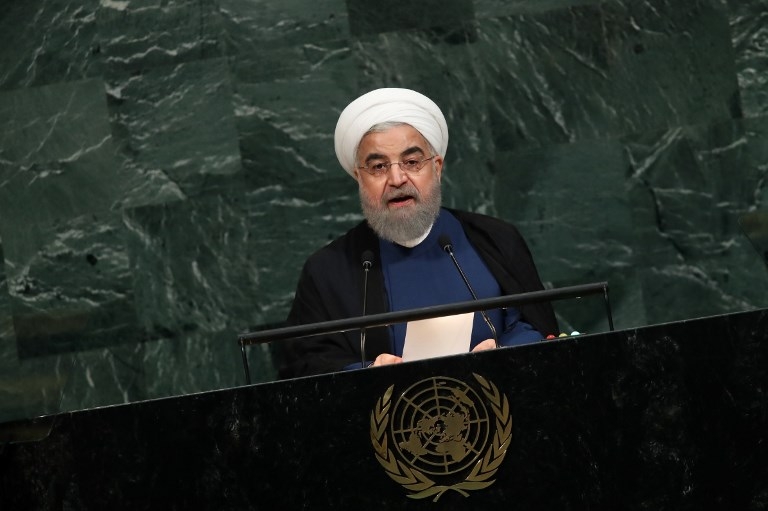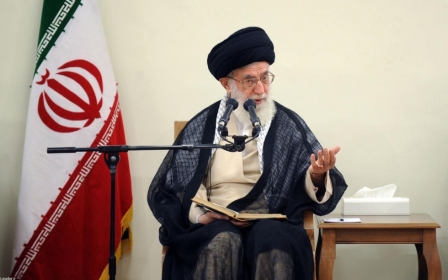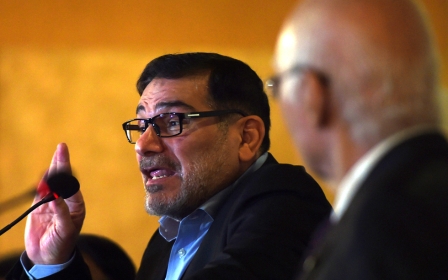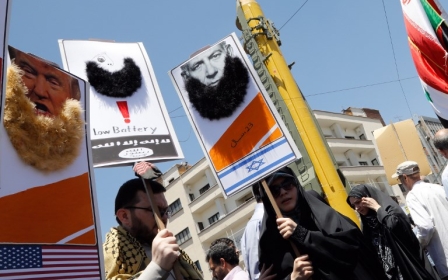Rouhani defends nuclear deal, calls Trump a 'rogue newcomer'

Iranian President Hassan Rouhani on Wednesday defended the nuclear deal, saying it was an internationally-backed accord that should not be destroyed by "rogue newcomers to the world of politics".
Hitting back at US President Donald Trump's threat to scrap the 2015 deal, Rouhani told the UN General Assembly that the deal had won global support and that its fate could not be decided by "one or two countries".
"It would be a great pity if this agreement were to be destroyed by rogue newcomers to the world of politics," Rouhani said, in a clear reference to Trump who blasted the deal in his UN address on Tuesday.
"The world will have lost a great opportunity," he declared.
Rouhani said he did not think Washington would leave the nuclear deal and said any country that abandoned the pact would isolate and embarrass itself.
"We don't think Trump will walk out of the deal despite [his] rhetoric and propaganda," Rouhani said.
"If American officials think that they can pressure Iran by walking out of the deal, they are making a big mistake," he added. "Either the nuclear deal remains as it is or it will collapse."
The Iranian leader pledged to uphold the agreement and vowed to "respond decisively and resolutely" to violations of the deal that provides for sanctions relief in exchange for curbs on Tehran's nuclear programme.
The deal was "overwhelmingly applauded by the international community and endorsed as part of Resolution 2231" adopted by the Security Council, Rouhani told the General Assembly.
"As such it belongs to the international community in its entirety and not only to one or two countries," he said.
Trump is due to report to US Congress by 15 October on whether he can certify that Iran is upholding its side of the accord, under which it accepted limits on its nuclear programme.
On Wednesday, Trump told reporters that he had reached a decision, but did not elaborate.
"I have decided. I'll let you know what the decision is," he said.
If Congress decides to reimpose economic sanctions - despite opposition from fellow deal signatories Britain, China, France, Germany and Russia - the agreement would likely collapse.
Under the nuclear deal, Iran surrendered much of its enriched uranium, dismantled a reactor and submitted nuclear sites to UN inspection, while Washington and Europe lifted some sanctions.
"By violating its international commitments, the new US administration only destroys its own credibility and undermines international confidence in negotiating with it or accepting its word or promise," Rouhani said.
The president slammed the "ignorant, absurd and hateful rhetoric filled with ridiculously baseless allegations that was uttered before this august body yesterday".
Trump in his speech Tuesday called the nuclear deal "an embarrassment" for the United States.
Speaking after Rouhani, Saudi Arabia's foreign minister said his country does not believe that Iran is abiding by the 2015 nuclear deal between the Islamic Republic and six world powers, without elaborating.
"We expect the international community to do whatever it takes to ensure that Iran is in compliance," the minister, Adel al-Jubeir, told reporters at the UN.
New MEE newsletter: Jerusalem Dispatch
Sign up to get the latest insights and analysis on Israel-Palestine, alongside Turkey Unpacked and other MEE newsletters
Middle East Eye delivers independent and unrivalled coverage and analysis of the Middle East, North Africa and beyond. To learn more about republishing this content and the associated fees, please fill out this form. More about MEE can be found here.




